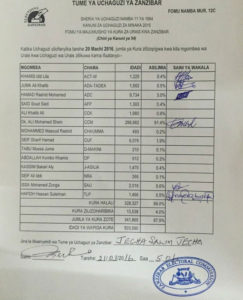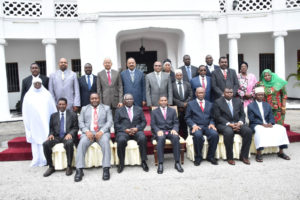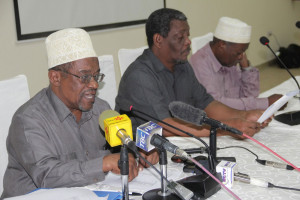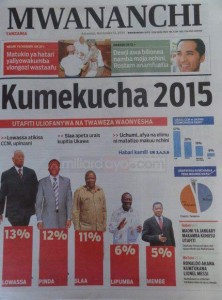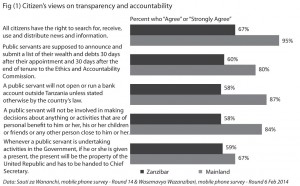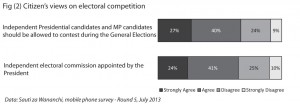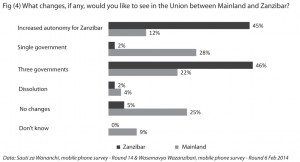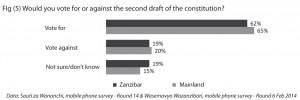by Martin Walsh
CRACKS IN THE DOME: FRACTURED HISTORIES OF EMPIRE IN THE ZANZIBAR MUSEUM, 1897-1964. Sarah Longair. Ashgate, Farnham, 2015. xvi + 322 pp. (hardback). ISBN 9781472437877. £75.
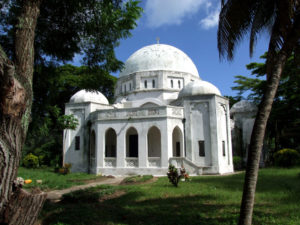
Beit-el-Amani in 2010 – photo Jonathan Stonehouse (wikimedia)
Museums are extraordinary institutions, and it is not surprising that they are sometimes likened to places of worship. The Zanzibar Museum is no exception. It was opened in 1925 as the Peace Memorial Museum, named in commemoration of those who had lost their lives in the First World War. Its faux Arabic name, Beit el-Amani, was clearly intended to echo those of Zanzibar’s royal palaces, most notably the Beit el-Ajaib or House of Wonders. It was built in hybrid Saracenic and Byzantine style with a large dome, leading locals to dub it ‘Msikiti wa Bwana Sinclair’, ‘Mr Sinclair’s Mosque’, after its British architect. In the early days it was also referred to as ‘Nyumba ya Mizimu’, ‘the House of Spirits’, a fair rationalisation of its apparent purposes. It is now generally known as ‘Makumbusho’ (sometimes ‘Makumbusho ya kale’), the contemporary Swahili term for museums as sites of historical memory.
Sarah Longair’s Cracks in the Dome is a compelling account of the Zanzibar Museum’s rise and fall, weaving together critical history and biography to show how its functions were contested and ultimately undermined by officialdom in the colonial period. Following an introduction that provides historical and interpretive context, the first two chapters examine the prehistory and construction of the museum in detail. Three central chapters describe the museum in its heyday, when it was curated by Dr Alfred Henry Spurrier (192535) and Ailsa Nicol Smith (1935-42), both of whom were driven, in their different ways, to innovate and make the museum into an educational resource that was of value to the whole community. Smith in particular was frustrated by the lack of funds and colleagues who shared her vision, and eventually resigned her post. A final chapter outlines the resulting decline of interest in the development of the museum, and its replacement by a decolonisation-inspired focus on the selection and collection of the materials that were to be housed in the Zanzibar National Archives – and have made the writing of this history possible.
Although the archives survived, the museum did not fare well after the Zanzibar Revolution. The building and displays fell into disrepair, with the natural history specimens in the museum annexe looking particularly worse for wear. More recently, though, funds have been found to repair and restore the museum, and it was re-inaugurated under its original names on the 18th of May this year, International Museum Day. The Peace Memorial Museum is not quite what it was in its first two decades – some its contents, including the library, are now in the House of Wonders, itself closed for repair – but it is encouraging to see that its educational potential is being recognised once again. Let’s hope that history doesn’t repeat itself, at least not in all of the ways that this fascinating study reveals.
Martin Walsh
HOW CAN TANZANIA MOVE FROM POVERTY TO PROSPERITY?
Lucian A. Msambichaka, John K. Mduma, Onesmo Selejio and Oswald .J. Mashindano (editors). Dar es Salaam University Press, Dar es Salaam, 2015. xxiv + 436 pp. (hardback). ISBN 978 9976 60 586 0. (no price given).
It is most welcome to find no fewer than 22 Tanzanians, mainly economists from the University of Dar es Salaam, engaging seriously with the challenges Tanzania faces in seeking to move towards middle income status. The broad approach is to frame the problem as a need to achieve structural transformation by moving away from relatively low productivity activities (notably agriculture, which currently occupies some 70% of the labour force) towards higher productivity activities (particularly manufacturing industry, currently about 10%).
Following an Introduction, the book is arranged in four parts: I. ‘Why Industrial Transformation Has Failed in the Past’ (Chapters 2-5); II. ‘Lessons from Other Countries’ (Chapters 6-12); ‘Utilising Natural Resources for Socio-economic Transformation’ (Chapters 13-15); IV. ‘Synthesis’ (Chapters. 16-20), leading to the final Chapter 21 ‘The Way Forward: Lessons and Recommendations’. In this review I will briefly summarise the key points emerging from the various contributions and then consider how far the final chapter offers a coherent blueprint for Tanzania to indeed progress from poverty to prosperity.
In Part I, the editors kick off (in Chapter 2) with a rather critical review of previous industrialisation efforts. There follows a substantial contribution (Chapter 3) by Joseph Simbakalia, an engineer and Director General of the Export Processing Zones Authority (EPZA). Flora Kessy (Chapter 4) reviews poverty reduction strategies, concluding that there was a set-back during the low growth period during the 1980s and 1990s, while subsequent better economic performance has been accompanied by rising inequalities. David Nyange (Chapter 5) then considers the contribution agriculture might make to economic transformation and job creation. He notes in particular the negative impact of rapid population growth but also potential positives if agriculture can respond to rising demand from urban areas and if more agro-processing can be developed. Overall this part of the book provides a useful overview. However, I missed any reference to John Sutton’s An Enterprise Map of Tanzania (2012), which documents major elements of the industrial development that has been achieved despite the difficulties.
In Part II we find a search for lessons from the experience of other countries: Vietnam (Blandina Kilama, Chapter 6); South Korea (the Editors, Chapter 7); Japan (Faustine Bee, Chapter 8); Brazil, India & South Africa (Jehovaness Aikaeli, Chapter 9); China (Suleiman Serera, Chapter 10); Malaysia, Singapore & Dubai (Abu Mvungi and Riziki Nyello, Chapter 11). The emphasis here is on how these countries have achieved industrialisation starting from a low base. While the disappointing results of some countries’ socialist industrial policies are noted, there is a divergence of opinion as to whether market liberalisation, central planning, strong leadership or other factors are what drives success, possibly because the range of countries considered is perhaps too diverse and not all appear immediately relevant to Tanzania’s own predicament. Also in this section is Chapter 12 by Damian Gabagambi and Andrew Coulson who argue persuasively for a more positive view of small farms in the Tanzanian context.
Part III addresses the potential of natural resources to drive economic transformation, with Tanzania’s recent natural gas discoveries in mind. Joseph Simbakalia (Chapter 13) considers how to avoid the ‘resource curse’, pointing to opportunities to develop upstream and downstream linkages, if Tanzania can address skill shortages and other constraints. Aloyce Hepelwa (Chapter 14) reaches similar conclusions, viewing Tanzania in a world energy market context. However, neither of them comments on the still considerable problems to be overcome in converting discoveries to viable production, not least the current weakening in world energy markets, with the risk of counting chickens not yet hatched. Nor do they give consideration to possible lessons to be learned from Tanzania’s own experience with gold and gemstone mining. Also in this section, Kenneth Mdadila (Chapter 15) reviews world industrialisation from a historical perspective, perhaps better read in conjunction with Part II.
Part IV explores a wider range of factors which may have a bearing on Tanzania’s economic transformation. Raphael Chibunda (Chapter 16) makes the case for a National Science, Technology and Innovation System for Tanzania. Jehovaness Aikaeli and Barney Laseko (Chapter 17) suggest that tackling informality in its various forms is hampered by lack of systems for registering people, land and businesses, although they may underestimate the size of the task. Reinforcing this point, Bashiru Ally (Chapter 18) documents the rise in land conflicts in Tanzania despite government reform efforts. Ally sees this as primarily a rural issue but equally important may be how to manage the acquisition of land to meet the needs of expanding urban areas. In a thoughtful contribution, Joel Silas (Chapter 19) takes up the theme of the impact of population growth on socio-economic development, concluding that policies to reduce fertility are needed if Tanzania is to reap any demographic dividend. Finally, Christian Gama (Chapter 20) argues that economic diplomacy also has a contribution to make.
Which brings us to the final chapter, ‘The Way Forward’. This is difficult to summarise. Nine ‘Key Observations’ lead to 15 ‘Key Messages’ and then 29 ‘Recommendations’, covering ‘Strategic Thinking’ (4), ‘Policy’ (13), ‘Good Governance’ (2) and ‘Human Capital and Infrastructure’ (10). Most of the points have some validity but many of the recommendations are pitched at a rather high general level and so need further fleshing out to become operational. The rather large number of observations, key messages and recommendations also suggest that prioritisation has proved difficult – indeed, in the Introduction, the editors state that “they are all of equal weight and importance”! Given that resources and government capacity are limited, the government may need to focus, as far as industrial policy is concerned, on those things that only government can do – macro-economic stability, good governance (including appropriate decentralisation), law and order and infrastructure provision, thereby creating a framework within which domestic as well as foreign enterprise can prosper. Related to this, it is only intermittently that one glimpses ‘the real Tanzania’ beneath the generalities, and what should be the proper balance between industry and agriculture remains unclear. To make an even greater impact, the authors perhaps need in future work to grapple more directly with the current situation in Tanzania so that their recommendations can be more precisely targeted.
Nevertheless, the volume provides much food for thought and it is to be hoped that Tanzania’s policy makers will take notice of it.
Hugh Wenban-Smith
Hugh Wenban-Smith was born in Chunya and went to Mbeya School. His career was as a government economist (mainly in Britain, but with periods in Zambia and India). He is now an independent research economist, with particular interests in infrastructure, urbanisation and transport.
THE WINDS AND WOUNDS OF CHANGE: THE MEMOIRS OF DICK EBERLIE. PART 3: 1961-65. Dick Eberlie. Privately printed, 2016. viii + 266 pp. (paperback). Available from the author.
This is the third volume of Dick Eberlie’s memoirs and the second dealing with Tanganyika, subsequently mainland Tanzania (Part 2, dealing with the period 1950-60, was reviewed in TA 111). Returning from UK leave in January 1961, Eberlie had hoped to be posted as a District officer to a rural district, instead of which he found himself pen-pushing in Dar es Salaam. This was a time when government and politics were moving rapidly. Sir Richard Turnbull, having been appointed Governor, was negotiating with both Julius Nyerere and the Colonial Office. It emerged in the end that Nyerere was pushing against an open door to achieve independence for the country.
With all the changes in government, many European civil servants were departing. So Eberlie, served in different ministries – Commerce and Industry, and Legal Affairs. During this time, he volunteered to help young District Officers pass their law exams; indeed references to his voluntary work occur throughout these memoirs, as, for example, when helping the Society for the Blind to raise funds, and later on, as editorial member of the Tanzania Society.
At last he got away from the enclosed atmosphere of Dar es Salaam and was posted as Staff Officer in Morogoro, effectively acting as Deputy to the Provincial Commissioner and being closely involved in the organisation of famine relief and local government developments. Pleased to be posted to Kisarawe again, he put much energy into applying government policies to ensure that famine relief was regulated and basic funds or food-in-kind paid out, as well as carrying out court and administrative duties.
Amidst all this vital work Eberlie was quite suddenly called to Dar is Salaam to be Aide de Camp (ADC) to the Governor, who, together with Lady Turnbull, he had already had contact with. Events crowded in as Tanzania became a Republic, Turnbull’s office closed, Eberlie’s parents came on a memorable visit, and Eberlie himself left the country when his job ended. There is some account of the Zanzibar Revolution and then the Tanganyika army mutiny in 1964. Characteristically, Eberlie offered himself as acting ADC to the British Army commander who had just landed to restore order in Dar.
Eberlie, however, had been invited by the Tea Growers Association to be its Assistant Secretary and completed a first contract with them. Despite being hospitalised in London mid-term, he was offered a new contract, which he reluctantly declined. Later he accepted an invitation to be Private Secretary to his old boss, Turnbull, who was then Governor of Aden. In an Appendix there is a detailed and interesting description of the tea growers scattered about the Usambara Mountains, Mufindi, Njombe, Tukuyu and Mount Rungwe. Being the third largest employer of labour in Tanzania, the tea producers were up against many difficulties including the changing political climate and Union pressures.
The book ends with a gloomy epilogue assessing the Tanzanian government at that time. But there is a good selection of maps and illustrations, all attractively wrapped in a panorama of Dar es Salaam harbour and redolent of his sailing and social days there.
Simon Hardwick
Simon Hardwick was an Administrative Officer in Tanzania, 1957-68, and Chairman of the Britain-Tanzania Society, 1995-2000.


